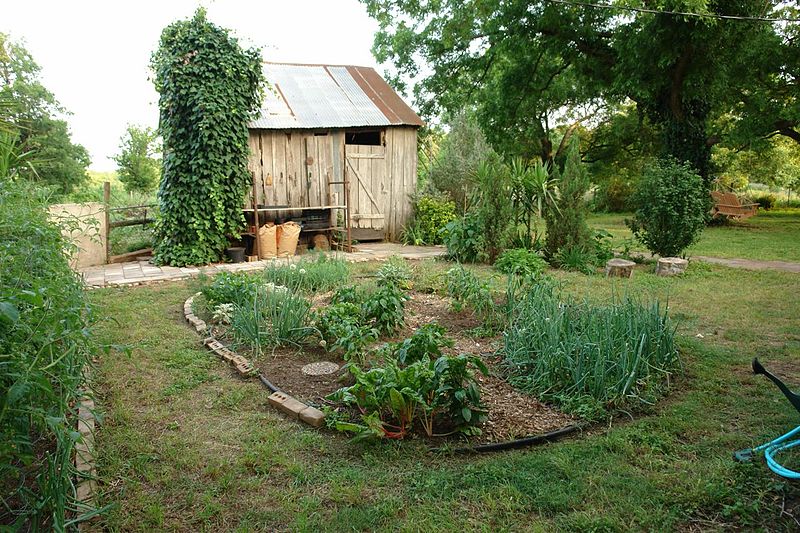Table of Contents[Hide][Show]

Seed catalogs for the upcoming growing season are arriving in mailboxes across the Northern Hemisphere with home growers everywhere starting to plan which seeds they will sow in freshly composted garden. A positive trend in recent years is the growing number of gardening enthusiasts choosing to plant gardens using organic and/or heirloom seeds.
What most of these home gardeners don’t realize is that corporate behemoth and GMO titan Monsanto has been gobbling up the seed market faster than a caterpillar can munch a tomato plant! With one fell swoop in 2005, Monsanto grabbed approximately 40% of the US vegetable seed market with its acquisition of Seminis.
This means that a home gardener could unknowingly be supporting the development and proliferation of genetically modified crops if the seeds used are from Seminis. In addition, Monsanto now apparently owns the trademark for many of the names of the heirloom seed varieties themselves!
Planting a sustainable home garden is much more than just choosing certified organic seeds and seedlings, eschewing pesticides/herbicides and using organic compost. This is because Monsanto has cleverly positioned itself to make money off the home gardening trend.
Does this mean that even if you buy organic or heirloom seeds from a completely independent company some of your purchase might be supporting the bad guys?
Yes, it does.
Surprise!
Home gardeners would do well to bone up on where to purchase their seeds so they aren’t inadvertently doing business with companies that maintain a working relationship with Monsanto-Seminis or were acquired by them.
Buying Organic or Heirloom Seeds Without Supporting Monsanto
Here are the recommended steps for the 2014 growing season for those who want to truly strike a blow for sustainability in every way with their home gardens:

Avoid buying from the seed companies affiliated with Monsanto. Here’s a list of these seed companies by location (enter you zipcode for a list of dealers to avoid).
- Buy from companies Monsanto HASN’T bought and are not affiliated or do business with Seminis: The graphic above indicates numerous companies that are worthy of your patronage as compiled by the International Seed Saving Institute. Please note that this many not be a complete list. If your seed company does not appear, just be sure to clarify with the owner about any potential affiliation with Monsanto-Seminis before buying from them.
- Avoid buying heirloom varieties for which Monsanto owns the trademark.
- Ask seed companies if they have taken the Safe Seed Pledge. Here’s a list of companies that have taken the Safe Seed Pledge and believe in responsible plant genetics. These are good companies to buy from.
Background on Monsanto’s Quest for World Seed Domination
Monsanto’s corporate quest is clearly to make money on each and every one of us whether we choose to eat supermarket frankenfoods produced with abominable, patented GM crops or carefully plant and tend an organic garden at home. Here’s some background information on the subject you may find interesting as well as enlightening:
If you are a home gardener and have information to contribute regarding these steps, please add to the discussion in the comments section. Also, please spread the word via gardening forums you may participate in that folks need to be very careful when seed sourcing for their spring gardens this year else they might be unknowingly supporting Monsanto.
Let’s make this the year when Monsanto’s grip on the worldwide seed market loosens and the movement to seed sustainability gains momentum!
Update
The day after this article was originally published in 2013, the CEO of a large GMO soybean seed company in the Midwest emailed me complaining that the article was short-sighted and insisting that Monsanto is helping feed the starving people of the world. He even went so far as to say that GMO crops are “proven safe”. Click here for the text of this CEO’s entire email plus my written reply.
I have also received email complaints from two other seed companies, one in Canada and one in Arkansas, that do business with Monsanto-Seminis and were offended by what they viewed as inaccuracies in the post. In response, I have adjusted the text slightly and moved linked sources to within the text rather than only listed at the end to make the message of the post as clear and precise as possible so as to not result in any consumer confusion over the information.
I have received no complaints about this article from seed companies completely independent of any affiliation or ties to Monsanto-Seminis.
More Information
Why I Avoid Organic Hydroponic Produce
The Hydroponic Invasion of USDA Organic
Heirloom vs Hybrid Produce
Photography Credit








Bottom line any company trying to create seeds that don’t produce seeds is a very bad thing. The only end result to this is a company that has totally rid the earth of what God had created, which are seeds that keep producing a next generation to feed humans of the world. PEOPLE DO SOME RESEARCH! You don’t have a right to create a monopolizing genocide “New World Order” by deleting all of Gods natural seeds for profit or control. It is every humans duty to stop companies such as these who secretly pass seeds and food to unexpecting people for all future generations. We don’t need genetically modified seeds that hurts the world. God already made them perfect. Plant will and have always naturally evolve. And for you disinformation spinsters on this site who work for these companies where are your morals? Is profit worth more than future generations of children who will have to live on this earth or have you already sold you soul? Yea you may not be 100 years from now but your children and grandchildren will. I couldn’t imagine a world where you can’t buy seeds unless it’s through the one company that covered the world with suicidal seeds. I can promise you one thing God will not stand for this and neither will humans who actually care about the earth. You’ve been warned.
Wow! Thank you for that very well put comment. I agree and sometimes I feel as if it really couldn’t be true because it seems soo diabolical but isn’t that what the native Americans thought as well I guess we should all beware of this dangerous convenience for it really is too easy to get strawberries in December
Greetings Sarah! I am from east coast Fl! ;-). I have been following your blog for quite some time, but I had a question! The graphic of all the seed companies that are good(?) looks like it is paired with companies Monsanto has bought…mountain rose herbs and territorial seed company are two of my faves…they are not owned by Monsanto right?
Mountain Rose Herbs is good … not sure about the other one.
Hello, does Donald Trump’s support Monsantos?, and since Monsanto produces so many seeds which turns into food why are there still people starving to death in the world?
Where can I find organic non gmo soil?
Hi Danie,
Have you tried organic compost? I have previously used lobster compost. Very great product.
Where do you live? Are you talking about potting soil or replacing soil in the ground?
– Mantis
we need to petition the gov on … neighbors and the gov NOT being able to use weed killers and lawn chemicals where other neighbors are trying to grow food. When neighbors use these chemicals they don’t stay put they drift and runoff onto neighboring properties … if second smoke is regulated, so should first hand poisoning.
It is getting increasingly difficult to keep these guys out of the garden, and there is so much confusion out there. I have written about it as well on my blog, Tomato Envy. Some of the confusion is about GMOs vs. hybrids – people think they are the same. And, some don’t realize that home gardeners cannot buy GMO seeds, but instead they could be financially supporting GMOs based on who they buy from. Thanks for this article and your helpful site!
I don’t think that most home gardeners would opt for a GMO seed anyway. At least I hope not. The USDA also states that a more correct term for GMO is GE (genetically engineered), so do we now have to wonder about products that say “NO GMO” on the package but the genetically modified trait still exist because of a loophole in terminology? Nothing would surprise me with our unregulated food system. Just like the USDA states about the “USDA ORGANIC” logo seen on packaging… “It is a marketing tool, it is not a statement about food safety, nutrition, or quality”.
Gardening is really good specially if you have your own space or plot to take care the veggies in the backyard. It is sad that a blatant act of aggressive control of the world’s supply is very rampant nowadays, one day there will be chaos in this planet. Monopoly even in food production is very visible wherever you go, I just hope that organic farming will be more prioritize than giant companies who use chemicals.
Home Gardeners Can’t Even Buy Genetically Modified Seeds
GMO SEED COMPANIES
American Seeds (This is not the Plantation Products Co.)
Asgrow
Audubon Workshop
Breck’s Bulbs
Campbell
Cook’s Garden – % of Monsanto Seed
De Ruiter
Dege Garden Center
DeKalb
Diener Seeds
E & R Seed Co.
Earl May Seed
Fielder’s Choice
Flower of the Month Club
Fontanelle
Garden Trends
Gardens Alive
Germania Seed Co.
Gold Country Seed
Hawkeye
Heartland
Heritage Seeds
Holdens
HPS
HPS Seed
Hubner Seed
icorn
Johnnys Selected Seeds – 4% Monsanto seed
Jung Genetics
Kruger Seeds
Lewis Hybrids
Lindenberg Seeds
McClure and Zimmerman Quality Bulb Brokers
Mountain Valley Seed
Natural Gardening Company – % of Monsanto seed
Osborne
Otis S.Twilley Seed Co.
Park Bulbs
Park Seed – % of Monsanto Seed
Park’s Countryside Garden
Peotec
Pioneer Seed (a DuPont company)
Poloni
R.H. Shumway
Rea Hybrids
Rocky Mountain Seed Co.
Roots and Rhizomes
Rupp
Seeds for the World
Seeds of the World
Seedway
Seminis Companies
Seymour’s Selected Seeds
Snow
Specialty
Spring Hill Nurseries
Stewart
Stokes
Stone Seed
T & T Seeds, Ltd.
Territorial Seed Company – small % of Monsanto seed
Tomato Growers Supply
Totally Tomatoes
Trelay
Vermont Bean Seed Company
Wayside Gardens
Western Seeds
Willhite Seed Co.
Thank you Joe – I needed a map! I bought a lot from Johnny’s recently…unfortunately! ugh – maybe I can return them.
I’m confused. I have “Black Beauty Eggplant” by “Seeds of Change” but Seeds of Change is not supposed to support Monsanto but the seeds are named using the Monsanto trademark?
Seeds of Change is owned by Mars Foods Inc which is a pro GMO company.
You have depicted the logos of the best seed companies in the U.S. and described them as such: Avoid buying from the seed companies affiliated with Monsanto. Here’s a list of these seed companies by location (click under “Where to Buy” and select your location for a list of dealers to avoid):
Are you deliberately trying to cause confusion?
I believe if you read the text, what she is saying is that Monsanto actually owns those companies.
Monsanto does not own Territorial Seed. My uncle, Tom Johns, does. Territorial is organic, non-gmo.
You apparently read this wrong. Territorial Seed is in the section that says:
Buy from companies Monsanto HASN’T bought and are not affiliated or do business with Seminis.
But they do deal with HILD which is owned by Bayer CropScience…developers of Liberty Link GMO and pesticides.